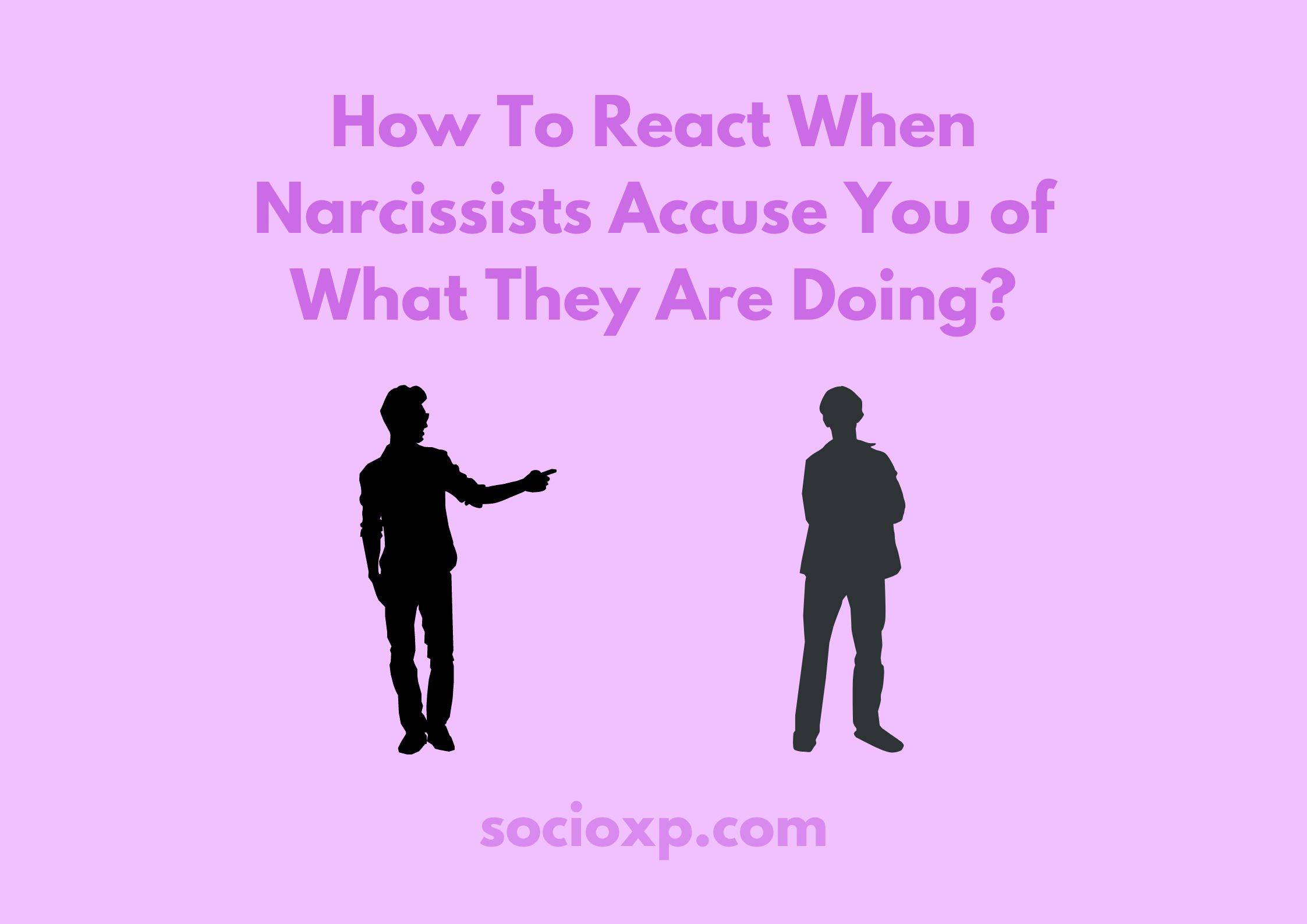What To Do When A Narcissist Calls You A Narcissist? (Give This Reaction)
What to do when a Narcissist calls you a Narcissist? Have you ever come across such a situation, where you have been gaslighted for someone or something that you are not? This often happens when you are either dealing with an abuser or a narcissist where they blame you constantly for their negative traits or call you out as someone that you are not!
When such a situation takes place, where you have been wrongly been called out for which you are not indeed, either you feel you have indeed become what they have been calling you out for and blame yourself or just get disappointed with yourself and move on. If this happens when you are dealing with a narcissist, here we will discuss all the possible ways to deal with it and find the answer to the question, “What to do when a Narcissist calls you a Narcissist?”.

Do Narcissists call others narcissists?
Yes! It is very much possible for a narcissist to call others around them about being narcissistic. A narcissist can always accuse others of being narcissistic rather than reflecting upon their own personality disorder. Some narcissists do this on purpose just to deflect attention away from their own narcissistic personality and behavior and play the blame game with others. By pointing someone else as the narcissist in the room, the narcissist would try to shift the blame or accusations from their own self to someone who is blaming them. This tactic of manipulation is known as the blame shift.
By calling someone else a narcissist, a narcissist would project their own insecurities onto others. A narcissist would label others as “Narcissistic” to just degrade or diminish their self-esteem or devalue them. They would accuse others of being narcissists to just hide their own lacking personality. But the most important thing here is to note that not all people who accuse or call out others as narcissists are narcissists. Also when someone else who is not a narcissist calls out someone else as a narcissist it is crucial to understand the intentions and context behind the use of such labels.
Narcissists reveal themselves by projecting their bad qualities onto you. They accuse you of the very things they are guilty of. They may even turn everything around and accuse you of being the narcissist. Narcissists can not handle the reality of who they are so they project it on to the people around them. They hate that part of themselves so the best way to get rid of the characteristics they despise is to say it is the other person who is actually engaging in those bad behaviors.
Maria Consiglio
According to a study, “The Narcissism Spectrum Model: A Synthetic View of Narcissistic Personality” published by Zlatan Krizan and Anne D Herlache, individuals rated themselves and their peers on narcissistic traits. The results showed that those with high levels of narcissism were more likely to rate their peers as more narcissistic than themselves, suggesting a projection of their own traits onto others.
Another research study done by mental health experts found that narcissistic individuals are more likely to label others as being self-centered and self-loving. The researchers suggested that this may be a way for narcissists to distance themselves from all the negative traits along with enhancing their own self-esteem.
Though both of these studies and research were not specifically targeted at the same topic, they are relatable to the topic that is being discussed here. Both these studies help to conclude the subject of the article which is the narcissist calling others narcissistic, their tendency to project their own traits and insecurities onto others, along with their accusations of narcissism.
Overall, in the conclusion of both these studies and research, it is suggested that narcissistic individuals may project their own traits onto others, including accusations of narcissism, as a way of protecting their own self-esteem and avoiding negative self-accusations and self-evaluation.

What does it mean when a Narcissist Calls You A Narcissist? – Why a narcissist would call other people narcissistic?
Dealing with a narcissist can be a tricky task, especially when they try to deflect their own flaws and insecurities onto you. The situation gets even trickier when they try to accuse others of being narcissistic or displaying narcissistic qualities which according to them is troublesome to deal with for them. This situation where they project their own tendencies onto others can be really frustrating and irritating but dealing with it correctly may be proven beneficial.
What are Narcissistic Projections?
Narcissistic Projections are a reaction or repulse actions that are an outcome of one’s guilt, wrongdoing, or something that one is not proud of in particular or is not ready to accept or reflect on self. It is a means that provides justification for one’s action by accusing or pointing fingers at others. This makes it easy to deal with a difficult situation, without much remorse. Narcissists use these projections more often, which does not even allow them to reflect on the wrongdoing.
The structure of projections gets more and more intense with time. This phenomenon is commonly and frequently observed among narcissists and so popularized. Narcissistic projections are like their hidden superpower according to them. They use it out of nowhere and leave you perplexed. They use these projections as a defense mechanism when they feel they would be exposed or their grandiose image is being questioned or tarnished.
A narcissist will blame you for so many things that you never said, did, or even thought, and do so with such conviction that you end up questioning every aspect of your identity.
– Annie Kaszina
Narcissists always want their ways to work out and project certain behavior onto others. That projection often includes their thoughts and thinking patterns. Their projection usually includes anger, guilt, blame, hatred, and unhealthy thoughts.
So to deal with it correctly, firstly it becomes important to understand why narcissists might use this tactic of accusing others of their own traits and tendencies. In general, narcissists are very self-centered and have a hard time accepting criticism. They often use the tactic of blame-shifting to deflect blame onto others. Narcissists always try to turn the table around to avoid taking accountability for their actions. When they accuse someone of having narcissism, they desperately try to project their own tendencies, insecurities, and traits onto others, as a way to rationalize their own behavior.
What is NPD(Narcissistic Personality Disorder)?
Narcissistic Personality Disorder is a mental health condition, where the patient has extremely high admiration for themselves, including boosted self-esteem, self-centeredness, high self-worth, boosted ego, and a low tolerance for criticism, emotions, and attachments.
Characterized by a grandiose sense of self-importance, a need for admiration, and a lack of empathy, narcissism is a personality disorder that affects approximately 1% of the population. Narcissists are often difficult to deal with because they have an inflated sense of self-worth that permeates every aspect of their lives. They may feel entitled, arrogant, and self-centered, and their behavior can be highly unpredictable, causing chaos and dysfunction in personal and professional relationships.
Narcissistic Personality Disorder is characterized by a lack of empathy for others, a grandiose sense of self-importance, and an immoderate need for admiration. Narcissists often believe that they are entitled to special treatment, and they tend to exploit others to fulfill their needs. The disorder typically develops in early adulthood and can persist throughout a person’s life. While Narcissistic Personality Disorder (NPD) is notoriously difficult to treat, it is essential to address the disorder as early as possible to prevent those affected from inflicting emotional harm on themselves and others.
Narcissists possess some traits that make them a little hard to deal with. Some peculiar narcissistic traits include,
- Lack of sensitivity and empathy.
- Are self-centric.
- Blame others for your mistakes.
- Have unhealthy relations.
- Arrogance and anger is your first reaction to any problems.
- Hate changes and also cannot take them well.
- Are emotionally unstable and unavailable.
- Takes advantage of others easily.
- Are abusive.
- Lack of self-awareness and self-reflection.
- Always expect more from others.

What to do when a Narcissist calls you a Narcissist?
When a Narcissist calls you a Narcissist, it is infuriating, but there are some ways that may help you deal with the situation in a better way. Those ways are mentioned below,
Staying calm and composed
Narcissists always wish to provoke a reaction out of you, so refusing to engage in an argument or confrontation can be an effective way to avoid giving them attention. Not engaging in any kind of drama, arguments, discussions or disagreements may subtle down the situation. Responding in a non-emotional and calm way and showing them that their behavior is not going to affect you, may save you from all the drama and trauma.
Before reacting to anything, take a deep breath and try to calm yourself down. This will give you time to think and respond rather than reacting impulsively.
Narcissists have a knack for provoking people and drawing them into a defensive argument. Try to stay calm and rational as much as possible. Do not take the bait or get caught in a blame-shifting or victim-blaming game. Keep your emotions in control when dealing with a narcissist. It is important to remain calm and composed during the conversations.
Reframing the conversation
Instead of responding to their accusation in a way that they expect you to, try a different approach in responding to them. Try reframing the complete conversation by asking questions that would shift the focus away from their accusations to a better and more interesting topic for them.
Set Boundaries
The first and foremost step in dealing with a narcissist who wants a reaction out of you is to set up clear and firm boundaries. This means being clear about what you will and will not tolerate from the narcissist. It is important to communicate these boundaries clearly, both verbally and in writing, and to stick to them consistently.
The first step is taking your power back by setting boundaries. Narcissists can be demanding and take up a lot of your time and energy. Setting boundaries helps you protect your time, space, and mental health. Setting boundaries means defining what sort of behaviors are acceptable, and what actions are not acceptable, and making it clear what all practices are acceptable and unacceptable. Narcissists tend to cross boundaries frequently. Being firm and assertive about your limits and holding them accountable if they violate them is also one of the best to set boundaries. You can save yourself from the narcissist blaming you to be a narcissist by holding up your guard by making firm boundaries.
Seeking Support
Dealing with a narcissist who is stuck on blaming others for their mistakes and traits can be emotionally draining. It is important to seek support from friends, family, or a therapist. This can help you to stay grounded and focused, and to maintain a sense of perspective amidst the chaos of their behavior. If the situation is difficult to handle, seek support from someone you trust or a mediator who can help resolve the situation.

Seeking an explanation from the Narcissist
One can also directly as the narcissist to explain why they think you are narcissistic. This puts the focus back on them and makes them accountable for the accusation. If they are unable to provide specific examples or reasons for their claim, then it is likely they are just simply trying to deflect the blame and distract you from the main topic.
Try defending yourself
When a narcissist calls you a narcissist, one possible reaction is to defend yourself or retaliate with the name-calling situation. But there are many chances that the retaliation may backfire and give the narcissist ammunition to use against you. Instead, the best approach is to remain calm and act logically.
Try to understand their perspective
Narcissists may project their own tendencies onto others, so it is possible that they are labeling you as a narcissist because they see qualities in you that remind them of themselves. You can also use the tactic of active listening or try using empathy. Acknowledging their concerns and asking them what they would like to see a change in your behavior. This can help them feel heard and validated, and may even defuse the situation themselves without you doing much altogether.
Inference
When a narcissist calls you a narcissist, it is important to stay calm and rational. Ask them to explain their reasoning, use empathy and active listening, and stand strong on your arguments. By doing so you can avoid getting dragged any further into the situation or their manipulative game of blame-shifting. This way you can maintain your sense of self-worth and avoid the accusations.
- How To Make A Narcissist Discard You And Leave You Alone? - March 21, 2024
- Narcissistic Supply: 9 Signs You May Be Someone’s Narcissistic Supply - March 11, 2024
- Narcissistic Abuse And Anxiety – 11 Symptoms of Narcissistic abuse-induced anxiety - March 9, 2024


